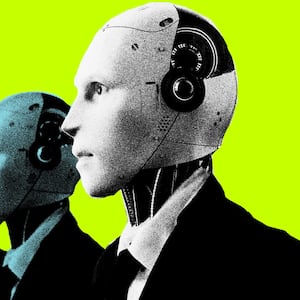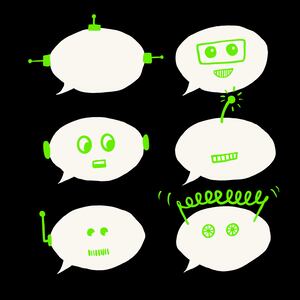We’ve all been there: wandering through the mall with a Muzak-induced migraine, trying to find the perfect thing for that person who is just so hard to shop for. Before you settle for a gift card, there is some good news: Artificial intelligence might just be Santa’s little helper this year. In fact, a slew of apps and generative AI chatbots promise to eliminate this downside by streamlining gift giving.
“The stress of holiday gift giving is real,” Aura De Los Santos, clinical psychologist and specialist at the E- HEALTH project, told The Daily Beast. In addition to the financial considerations, she observes, “there is just the worry that the other person will not like or be happy with the gift.”
As the old adage goes, it’s better to give than receive, but giving can be fraught with societal pressures. It turns out that the majority of people are stressed out by the gifting process. So if holiday shopping contributes significantly to the prevalent sense of seasonal overwhelm, new AI interfaces have the opportunity to boost mental health during a notoriously touchy time of year.
“Seeing an endless barrage of advertisements aimed at you and your children on social media, YouTube, and other platforms can increase [gift giving] pressure,” Charlynn Ruan, clinical psychologist and founder and CEO at Thrive Psychology Group, told The Daily Beast.
Yet experts have balked at the recent proliferation of open natural language chatbots like OpenAI’s ChatGPT and Google’s Bard, calling AI a “societal-scale risk” that could lead to human extinction. While AI gifting assistants could make your holidays a little bit more jolly, they may also open the doors to the inherent dangers of emerging technology like bias. It could even lead to the depersonalization of the gift-giving process, sucking joy out of what’s supposed to be a holly jolly season.
Santa’s Little AI Helper
AI-directed search recommendations have long been a part of shopping sites. It’s how places like Amazon and Etsy have recommended you products for years. However, newer generative tools have massively changed e-commerce. For a long time, business owners and developers subscribed to the mentality that more is better. Most online retailers like Amazon aimed to offer their users as many options as possible, working to increase cart size by providing additional product recommendations with each click.
Newer sites seem to be taking the opposite approach—especially those designed to secure the loyalties of Millennial and Gen Z shoppers—focusing more on ease of use. For example, baby registry site Poppylist offers a streamlined, minimalist experience. “We try to remove as many steps as possible,” Tamiz Ahmed, Poppylist co-founder and CTO, told The Daily Beast.
Today’s shoppers don’t want to sift through absolutely everything that fits their parameters. They want to be directed to the best and skip over the decision fatigue that comes with thousands of search results.
Enter: AI. Ahmed says that he’s optimistic that the technology will help hone search results and dial back some of the distraction inherent in the contemporary online shopping experience. The idea is that it’ll make things easier for customers; instead of requiring users to input multiple search terms and employ filters to whittle down their results, AI can source exactly what the user wants.
Perhaps the biggest and best example of this comes from Google. The search engine giant has upgraded its AI-powered Generative Search Experience ahead of the December holidays, expanding its virtual try-on service and announcing plans to launch a tool that enables users to create an image of a dream product. If you’re not able to find what you’re looking for in regular search, you’ll be able to enter a text description in generative AI search and then click a new “generate images” button to browse bot-made photorealistic images that match your specifications.

Google’s Generative AI search can help you find a product—even if it doesn’t technically exist. The technology can help hone search results and dial back some of the distraction inherent in the contemporary online shopping experience.
GoogleThese images can be refined by entering additional descriptors in the search box. Once the user is satisfied with their image, they will be able to scroll to see search results for similar, existing, purchasable products.
For example, if you search “I want a gift for a violin teacher” into Google’s AI generative search, it displays several categories of gifts including “Teaching Materials, Violin Accessories, and Music Books,” providing links to existing products in each category. It also includes broader, non-linked suggestions like “Concert Tickets” and “Gift Certificate” with a sentence under each explaining why the recipient might appreciate them.
But if you used the same query via Google’s regular search engine, more than 208 million results were generated. Sure, you might be able to find recommendations—but it would take much longer and be a more frustrating experience.
(The company has also acknowledged the potential of its AI tools to transform the holiday season in a blog post published in November describing different ways their generative search can help alleviate shopping woes.)
Beyond providing more tailored results, the real paradigm shift that comes with this type of AI is the switch from a text-based to an image-based search process. Until now, queries had to include keywords and be structured in a way that search sites recognized. This new generation of AI, on the other hand, is getting better and better at analyzing images.
Ahmed sees this as a serious boon for the online shopping space. “Having an empty box for the user to enter a prompt into can be pretty intimidating. They don’t often know what to say even if you give them examples,” he said.
Newer AI tools allow users to upload a photo, or in the case of Google, even create and edit a photo based on multiple descriptors. These programs are able to better understand the way that humans naturally communicate, eliminating a longstanding and cumbersome translation barrier and providing results that more closely meet a user’s needs.
These new AI interfaces also allow developers and entrepreneurs to incorporate AI into their sites without using code. “It just means there’s going to be a lot of great ideas that are going to be brought to the market from people that maybe couldn’t have done it before because maybe they didn’t have the technical capabilities,” Tamiz said.
Developers are already taking full advantage of this newfound ease of use. Apps like Ollie.ai utilize a chatbot to help you narrow down a gift based on a few queries like “Christmas gift for wife who loves the outdoors.” It’ll chat with you as if you’re talking to your own personal elf at Santa’s workshop. Not only does it furnish some gifts that it thinks that might work based on your query, but it’ll send you across all different websites to help purchase it like Etsy and Amazon.
You’re a Mean One, Mr. GrinchGPT
At some point, though, tools like this do cross a line. If these new apps and tools mean a person can fulfill their holiday gift list with little thought and a few clicks, is there really a point to doing it at all?
The answer here is complex, and ultimately depends on the values of and relationship between the giver and the receiver. Some holiday gifts are simple. Ponying up extra cash for or slipping a gift card to folks like housekeepers or babysitters at the end of the year requires little deep thought. Using AI to choose and send gifts for these types of relationships hardly seems controversial.
However, when it comes to giving gifts to those we know and love well, the lines are blurrier. Would the recipient be upset to know that AI chose the gift rather than the giver?

AI has a long and sordid history due to the inherent bias built into its training data. Google’s generative AI tools are no exception—with many instances of it spewing misinformation and hate at user queries.
Kseniya Ovchinnikova via GettyMoreover, there are also the issues inherent to AI to consider, like bias and harm. The emerging technology has a long and sordid history due to the inherent bias literally built into its training data. Google’s Generative AI tools are no exception—with many instances of it spewing misinformation and hate at user queries. Other notable instances have occurred with OpenAI’s ChatGPT and Microsoft’s Bing chatbot as well.
It’s one thing to depersonalize your gift giving experience with a chatbot. It’s another thing entirely to put it into the hands of a technology that has been known to say harmful and hateful things.
In the end, though, it is a combination of how AI is used and for what reason that will ultimately determine whether you should use it. Utilizing it to focus and personalize results can be a useful shortcut to ensuring that we give our loved ones something they actually want.
So go ahead and use AI to make the holidays a little easier—just do it mindfully. The technology, used as one of many strategies to help streamline holiday gift giving, can free up precious mental space during the jam packed holiday season. As always, though, don’t let it make the holidays all about a commercial exchange. Yes, we appreciate gifts for the gifted object itself, but more importantly, gifts are a symbol that you value the recipient and your relationship.
“Rarely do people remember the gifts they receive, but the memories of holiday experiences and connection are what brings the most joy,” Ruan said. This holiday, you can let technology give you a leg up. Just use your new-found time to relax and connect—leaving any grinchy feelings behind.









